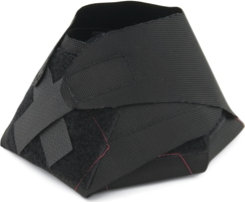Megan wrote to ask about using threats to train horses....."Hello. I am under the perception that using treats to train or reward horses is a big thing to avoid. However, it makes sense to me as other animals like dogs do very well with understanding commands using treats as an incentive. A friend of mine said she watched a television program where a woman horse trainer was using treats with good results. Can you write about this?"
Bear with me Megan, as I'm going to get to your question in around about way. I would be lying if I said I don't give my horses treats by hand. Several times a week I'll stand among my horses and cut up a carrot or an apple and give them pieces. It wouldn't be uncommon for a horse to get pushy for a treat. If one of my horse's does this, I'll just back him off and make him wait, before I ask him to approach and get a treat again. There are some who despise feeding horses by hand saying that it spoils them and teaches them bad habits. I think that it certainly can spoil a horse, and the more you do it the more likely the horse will become spoiled. But I also think they'll become spoiled only if you let them.
I'll also give my horses cookies from the saddle or let them drop their heads to eat when I want them to eat if I'm in the saddle for several hours. This is another thing that is highly opinionated as some will absolutely refuse to let their horses eat when they are saddled or especially so when they are in the saddle. My practice has been to allow my horses to drop their head and grab some grass when I give them a cue. I don't like horses, especially when moving, to try and grab as something. I correct this immediately. But, I think it's good to keep their stomachs moving when you can, especially when you are out for a long day.
If you give horses treats by hand from the saddle, you'll have to be aware of your horse stopping on his own, looking back at you and expecting a treat.
I like to say that horse's only think about one thing,.... Feed......but they think about it in two ways: where to get it and how not become it. If you are always giving your horse treats then the more inclined he is to look for them. If he's looking for cookies, then he's thinking about cookies,.... if he's thinking about cookies, he's not thinking or prepared to respond to you and what you are asking him to do.
There is some research or belief that when horses eat, they release endorphins producing a calming or sedative type effect. Some think that even when a horse drops his head, to the ground searching for feed, that they will get calmer. I have a head down cue for my horses, the same cue I use to let them know it's okay to drop their head and graze. It has come in handy when I've rode upon something really spooky for the horse. I'll ask my horse to drop his head. And while his head may go down and come back up quickly, it'll generally stay lower and longer after subsequent asking. As much as anything it gets him focused on what I am asking as opposed to the spooky thing. But if you try to use treats to calm your horse, I think you'll only generate a horse who looks for treats.
As far as using cookies or treats to train your horse, I guess the idea is to reward the horse with a treat once he performs as you ask. While I don't intentionally use treats to train horses, it probably has its place. I suppose if you got into the habit of giving treats out to horses in a corral or a pasture, at some point these horse would be looking for you and approaching you to get a treat. May come in handy if you don't want to walk that far to collect up a horse or if you have a horse who are a little narly when it comes to catching.
I have spent a lot of words and space not really answering your question, Megan, because I don't know enough about training with treats to really give you a good opinion. About the only time I can think of giving treats as somewhat of a training tool was asking a horse, who was 30 feet away from the trailer, to go into the trailer and stand. I did that more out of being happy with him picking that up so quick, than using it as a training tool, if that makes sense. The bottom line is that I think the best reward for a horse is in the release of pressure, whether it's mental or physical pressure. The release of pressure isn't a subtle release or a 50% release. It is a total release. And it pays to give the horse the time to think about what just happened when he has earned that release. This is the way I try to approach my horses.



















No comments:
Post a Comment